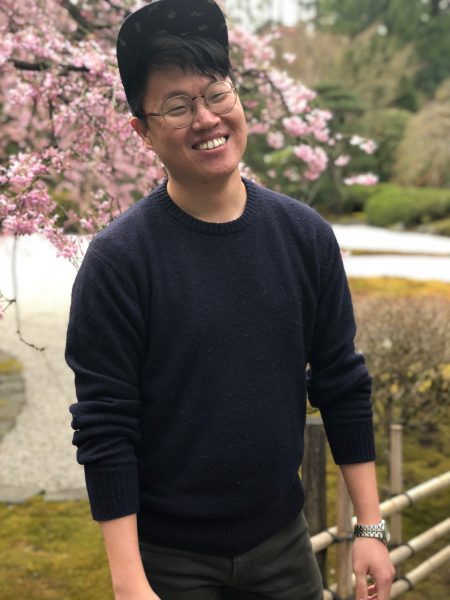Are there certain themes you find yourself returning to in your writing?
A lot of my writing comes from a place of fear, which is why climate change is such a frequent background theme. A friend recently pointed out how I often write about the fleeting nature of relationships and human connection, and I think a lot of that draws on my personal fears about loneliness and longing, though I promise that I have a cheery disposition outside of writing.
Most of my stories also involve food or the act of eating. Food just entails a lot, from basic sustenance to hospitality to dependency on earth. Food is kind of a way for me to counteract or familiarize those fears into something grounded that I can touch and taste and smell.
More recently, I’ve been considering my Korean-ness a lot more and the way I take up space as a Korean-American. I don’t really know if I’m all the way to incorporating it into my writing, just because I want to treat my culture, heritage, and family history with the respect and nuance they deserve, but it’s good to think about all the same.
You write a TinyLetter called aspirin and honey. Can you tell us how you got started with these letters? How do your letters relate (or maybe even contrast) with your other writing?
I had to check my archives, and it is wild to me that I started writing my TinyLetter back in 2014. That started thanks to the amazing and inimitable Mary-Kim Arnold, who is one of my writing idols. After knowing her online for what seems like forever, I finally met her at this past AWP, and she is as warm, kind, and thoughtful as I could have ever imagined. Anyway, she started one all those years ago, and I just kind of followed suit. At the time, I just really liked the intimacy of TinyLetters, the way they had this capacity to feel like late-night conversations with a friend. It has since become an easy space for me to write regularly without any inward or outward pressures. I know others use their TinyLetters as promotional newsletters (which is totally cool and great!), but mine really is an extension of my Tumblr, my Livejournal, and my physical diaries before all that. While there is a relatively small audience still involved with my TinyLetter, it still has a tone of privacy that I really enjoy and crave.
In terms of relationship to my fiction, I think my letters do tend to have a layer of melancholy and loneliness that can carry over into my flash fiction. Admittedly, I might be too close to really see or judge their relationship to my writing as a whole. I have dipped into moments of fiction in some previous letters, but I try to avoid it if I can, just because I really do try to think of them as correspondence. Imagine getting a letter and it vacillates between fiction and reality. Granted, no promises I won’t do that in future letters.
I also write my letters with a single person (“You”) in mind, which helps me steer the writing and maintain a more conversational tone. That combined with the general lack of pressure also gives me the chance to just write without thinking, so there isn’t really much flow to it (or at least any intentional flow). With my flash, I write with a lot more intentionality. I plan out a plot, I think about my characters, and I’m pretty meticulous about how words, sentences, and punctuation move together through all of that.
What is one thing you love about flash fiction (either as a reader or a writer)?
I really love the versatility of flash. At AWP, I was at a reading for Forward, a flash fiction anthology featuring writers of color, and it was honestly so exciting and humbling to experience the ways that writers are using flash and shaping it into this beautiful, unique narrative form. No two stories in the anthology are the same, but there’s also this through line to the form that I have trouble really defining or pinning down.
If you can’t tell, I’ve been thinking a lot about flash as its own entity, how it’s more than this liminal form between poetry and fiction. Flash is more than a phase.
What kind of story would you love to see in the queue this week?
All of the usual things apply, of course—well-developed characters, engaging plot, a concrete sense of place, attention to word choice and rhythm. On top of all that, I could really go for some sincerity. The world is not in a great place right now, and I’m just really tired of the irony and cynicism. That doesn’t mean I want forced happiness, empty optimism, and sunshine and rainbows, but be sincere. Make me feel something true, whether it’s warm sun or sudden rain. Make every syllable matter.


 The core workshop of SmokeLong Fitness is all in writing, so you can take part from anywhere at anytime. We are excited about creating a supportive, consistent and structured environment for flash writers to work on their craft in a community. We are thrilled and proud to say that our workshop participants have won, placed, or been listed in every major flash competition. Community works.
The core workshop of SmokeLong Fitness is all in writing, so you can take part from anywhere at anytime. We are excited about creating a supportive, consistent and structured environment for flash writers to work on their craft in a community. We are thrilled and proud to say that our workshop participants have won, placed, or been listed in every major flash competition. Community works.